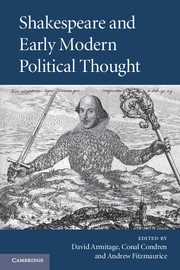Book contents
- Frontmatter
- Contents
- List of contributors
- Acknowledgements
- List of citations and abbreviations
- Introduction
- PART I CONTEXTS
- PART II THE COURT
- PART III THE COMMONWEALTH
- 10 Putting the city into Shakespeare's city comedy
- 11 Talking to the animals: persuasion, counsel and their discontents in Julius Caesar
- 12 Political rhetoric and citizenship in Coriolanus
- 13 Shakespeare and the best state of a commonwealth
- Afterword: Shakespeare and humanist culture
- Index
13 - Shakespeare and the best state of a commonwealth
Published online by Cambridge University Press: 18 January 2010
- Frontmatter
- Contents
- List of contributors
- Acknowledgements
- List of citations and abbreviations
- Introduction
- PART I CONTEXTS
- PART II THE COURT
- PART III THE COMMONWEALTH
- 10 Putting the city into Shakespeare's city comedy
- 11 Talking to the animals: persuasion, counsel and their discontents in Julius Caesar
- 12 Political rhetoric and citizenship in Coriolanus
- 13 Shakespeare and the best state of a commonwealth
- Afterword: Shakespeare and humanist culture
- Index
Summary
Political thought in Shakespeare's Europe organised itself to a significant degree around the question of what constituted, in Cicero's words, ‘the best state of a commonwealth’. Thomas More famously offered his Utopia as a meditation upon this question, entitling the book De optimo reipublicae statudeque nova insula Utopia (‘On the best state of a commonwealth and the new island of Utopia’), and virtually every other humanist author had something extensive to say on the subject. In this respect, the early modern period was hardly unique; political writers had been interested in this question long before Plato raised it in the Republic, and they would continue to be interested in it even after Tocqueville declared the question dissolved in 1835. What distinguishes the early modern period is rather the astonishing degree to which political writers of the age agreed that the answer to this question was to be found in the study of Roman history. To compare the relative merits of monarchy and civic self-government during this period was unavoidably to ask whether Rome had reached its zenith before or after the rise of the Caesars. Machiavelli, following in the footsteps of Leonardo Bruni and the other civic humanists of the Quattrocento, argued that the transition from republic to principality had been responsible for Roman decline. In Book II of the Discourses on Livy, Machiavelli announces that ‘experience shows that cities have never increased either in dominion or wealth, unless they have been free’, and that Rome attained its ‘greatness’ (grandezza) as a free state.
- Type
- Chapter
- Information
- Shakespeare and Early Modern Political Thought , pp. 253 - 270Publisher: Cambridge University PressPrint publication year: 2009
- 3
- Cited by



